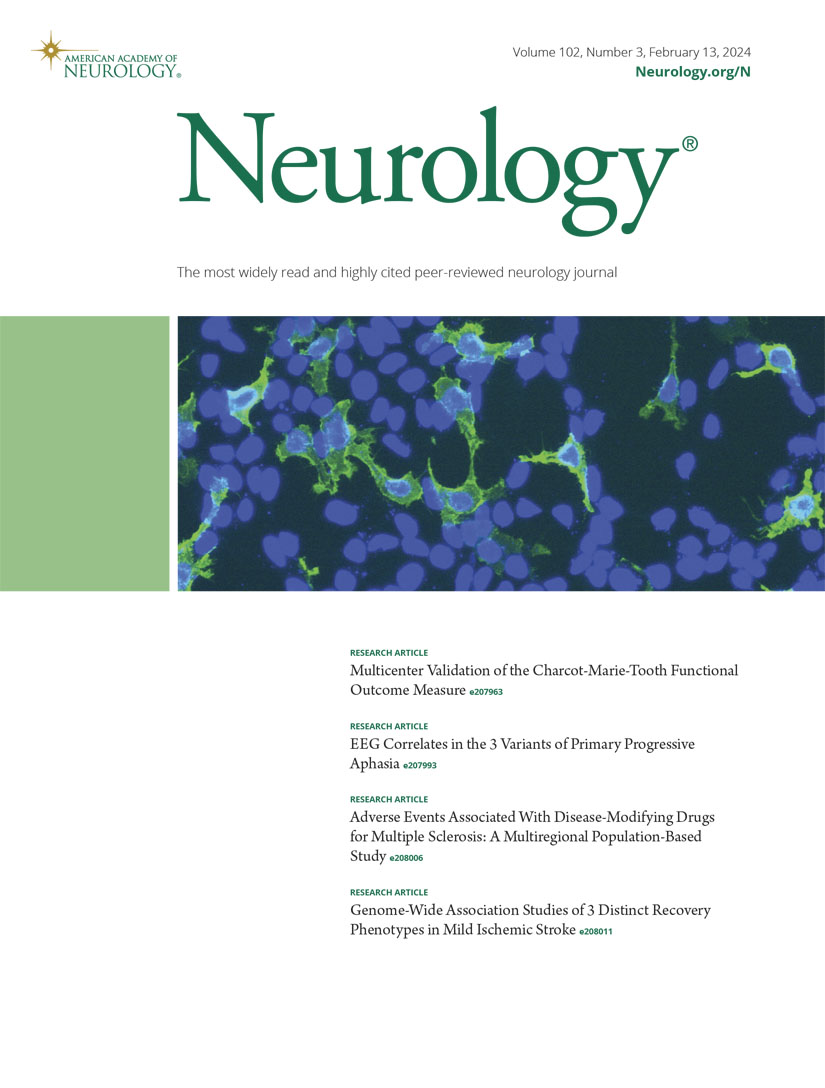elsa -巴西研究:早期到中年体重轨迹与中老年认知能力下降的关系
IF 7.7
1区 医学
Q1 CLINICAL NEUROLOGY
引用次数: 0
摘要
背景和目的虽然中年肥胖一直与晚年认知能力下降有关,但人们对早期到中年体重变化如何影响认知能力下降的了解有限。我们调查了早期到中年体重轨迹与中老年认知能力下降之间的关系。方法这是一项纵向队列研究,使用了巴西成人健康纵向研究的3波(2008-2019)数据,这是一项多中心队列研究,招募了巴西公立大学35岁以上的在职和退休公务员。有中风史、基线认知数据缺失和体型数据不完整的参与者被排除在分析之外。根据斯蒂卡德身材评定量表,从5岁到40岁的自述体型被分为体重不足、正常、超重和肥胖。序列分析和层次聚类识别权重轨迹。整体认知z分数来源于记忆(即时回忆、延迟回忆和对单词列表的识别)、语音和语义语言流畅性以及轨迹制作测试B部分(TMT-B)。调整了社会人口学、临床和生活方式协变量的线性混合模型调查了体重轨迹集群与全球认知z分数之间的关系。使用减员权重的逆概率来解释减员偏差。结果在11361名参与者(平均年龄:51.5±8.6岁,女性占55%,黑人/混血儿占42.4%)中,“正常到超重”、“体重不足到正常”和“稳定超重”轨迹比“稳定正常”轨迹表现出更快的全球认知衰退(β = -0.024;95% CI -0.043 ~ -0.005;P = 0.015;β = -0.026;95% CI -0.040 ~ -0.012;P < 0.001;β = -0.034;95% CI -0.066 ~ -0.001;P = 0.043),在中位8年的随访中,代表了4.6-6.5年的认知老化。与体重轨迹相关的认知能力下降主要是由记忆力和TMT-B表现下降引起的。当分层时,仅在黑人/混合种族和女性中观察到关联。从早期到中年,体重增加和稳定的超重轨迹与认知能力下降的速度比稳定的正常体重轨迹更快相关。在生命早期控制体重可以减轻认知能力下降。研究的局限性包括依赖于自我报告的体型数据,潜在的回忆偏差,以及未测量的早期生活因素的残留混淆。本文章由计算机程序翻译,如有差异,请以英文原文为准。
Association of Early- to Midlife Weight Trajectories With Mid- to Late-Life Cognitive Decline in the ELSA-Brasil Study.
BACKGROUND AND OBJECTIVES
While midlife obesity is consistently associated with cognitive decline in later life, there is limited understanding of how weight variations from early life to midlife affect cognitive decline. We investigated the association between early- to midlife weight trajectories and mid- to late-life cognitive decline.
METHODS
This is a longitudinal cohort study that used data from 3 waves (2008-2019) of the Brazilian Longitudinal Study of Adult Health, a multicenter cohort study that enrolled active and retired public servants aged 35+ years from public universities in Brazil. Participants with a history of stroke, missing cognitive data at baseline, and with incomplete body shape data were excluded from the analyses. Self-reported body shapes from ages 5 to 40 using the Stunkard Figure Rating Scale were categorized as underweight, normal, overweight, and obese. Sequence analysis and hierarchical clustering identified weight trajectories. Global cognition Z-scores were derived from memory (immediate recall, delayed recall, and recognition of a word list), phonemic and semantic verbal fluency, and Trail Making Test part B (TMT-B). Linear mixed models adjusted for sociodemographic, clinical, and lifestyle covariates investigated associations between clusters of weight trajectories and global cognition Z-scores. Inverse probability of attrition weighting was used to account for attrition bias.
RESULTS
Among 11,361 participants (mean age: 51.5 ± 8.6, 55% women, 42.4% Black/mixed race), "normal to overweight," "underweight to normal," and "stable overweight" trajectories exhibited faster global cognitive decline than "stable normal" trajectory (β = -0.024; 95% CI -0.043 to -0.005; p = 0.015; β = -0.026; 95% CI -0.040 to -0.012; p < 0.001; β = -0.034; 95% CI -0.066 to -0.001; p = 0.043, respectively), representing 4.6-6.5 excess years of cognitive aging over a median follow-up of 8 years. Cognitive decline associated with weight trajectories was driven mainly by declines in memory and TMT-B performance. Associations were observed only in Black/mixed races and women when stratified.
DISCUSSION
Weight gain and stable overweight trajectories from early life to midlife were associated with faster cognitive decline than stable normal weight trajectories. Weight management during early life may mitigate cognitive decline. Study limitations include reliance on self-reported body shape data, potential recall bias, and residual confounding from unmeasured early-life factors.
求助全文
通过发布文献求助,成功后即可免费获取论文全文。
去求助
来源期刊

Neurology
医学-临床神经学
CiteScore
12.20
自引率
4.00%
发文量
1973
审稿时长
2-3 weeks
期刊介绍:
Neurology, the official journal of the American Academy of Neurology, aspires to be the premier peer-reviewed journal for clinical neurology research. Its mission is to publish exceptional peer-reviewed original research articles, editorials, and reviews to improve patient care, education, clinical research, and professionalism in neurology.
As the leading clinical neurology journal worldwide, Neurology targets physicians specializing in nervous system diseases and conditions. It aims to advance the field by presenting new basic and clinical research that influences neurological practice. The journal is a leading source of cutting-edge, peer-reviewed information for the neurology community worldwide. Editorial content includes Research, Clinical/Scientific Notes, Views, Historical Neurology, NeuroImages, Humanities, Letters, and position papers from the American Academy of Neurology. The online version is considered the definitive version, encompassing all available content.
Neurology is indexed in prestigious databases such as MEDLINE/PubMed, Embase, Scopus, Biological Abstracts®, PsycINFO®, Current Contents®, Web of Science®, CrossRef, and Google Scholar.
 求助内容:
求助内容: 应助结果提醒方式:
应助结果提醒方式:


